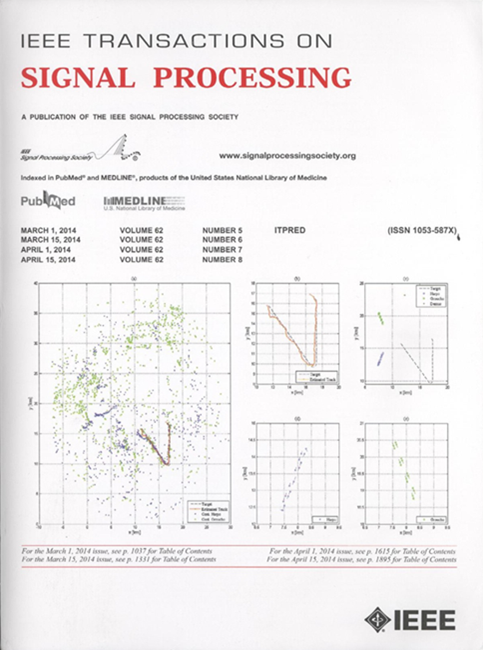基于支持度估计的噪声无线传感器网络1位压缩感知增强
IF 4.6
2区 工程技术
Q1 ENGINEERING, ELECTRICAL & ELECTRONIC
引用次数: 0
摘要
一比特压缩感知(1-bit CS)是一种极具吸引力的低比特分辨率信号处理技术,已成功应用于大规模无线网络的设计。在这项工作中,我们考虑了无线传感器网络(WSNs)中的1位CS问题,其中融合中心(FC)旨在恢复基于从本地传感器节点接收到的一些二进制测量值的稀疏信号,这些测量值被信道引起的位翻转错误损坏。在这里,信号支持和它的基数都不假设是已知的。本文提出的分布式稀疏信号恢复的信号处理协议包括以下三个步骤:(i)每个局部传感器使用一个稀疏感知向量将其观测值有效地压缩为标量;(ii)为了节省能量和带宽,只有具有信息量的标量测量值的传感器才会将其实值压缩测量值量化为一位;(iii)这些传感器然后将其量化数据转发给FC进行全局信号恢复。大多数现有的1位CS方法完全依赖于测量的符号信息,与之相反,我们提出了一种新的幅度辅助信号检索方案,以增强对比特翻转错误的鲁棒性。在我们的算法中,我们首先使用简单的能量检测器识别信号支持,并推导出完美支持恢复的分析性能保证。在获得支持知识后,我们通过最小化由量化误差、局部感知噪声和比特翻转误差引起的均方误差,在FC处解析导出了封闭形式的局部1位量化器的最佳表示级别。在最优表示水平和支持度估计的基础上,我们提出了一种改进的单面最小算法来提高信号重建性能。对该算法的收敛性进行了理论分析。计算机仿真验证了所提方案的有效性。本文章由计算机程序翻译,如有差异,请以英文原文为准。
Enhancing 1-Bit Compressive Sensing With Support Estimation in Noisy Wireless Sensor Networks
One-bit compressive sensing (1-bit CS) is an attractive low-bit-resolution signal processing technique that has been successfully applied to the design of large-scale wireless networks. In this work, we consider the problem of 1-bit CS in wireless sensor networks (WSNs), where the fusion center (FC) aims to recover a sparse signal based on a few binary measurements received from local sensor nodes and corrupted by channel-induced bit-flipping errors. Here, neither the signal support nor its cardinality is assumed to be known. The proposed signal processing protocol for distributed sparse signal recovery consists of the following three steps: (i) each local sensor employs a sparse sensing vector to efficiently compress its observation into a scalar, (ii) to conserve energy and bandwidth, only sensors with informative scalar measurements will quantize their real-valued compressed measurements into one bit, and (iii) these sensors then forward their quantized data to the FC for global signal recovery. In contrast to most existing 1-bit CS methods, which rely fully on the sign message of measurements, we propose a new amplitude-assisted signal retrieval scheme to enhance robustness against bit-flipping errors. In our algorithm, we first identify the signal support using a simple energy detector and derive an analytical performance guarantee for perfect support recovery. After obtaining the support knowledge, we then analytically derive the optimal representation level of local 1-bit quantizers in closed-form by minimizing the mean square error, resulting from quantization error, local sensing noise, and bit-flipping errors, at the FC. With the aid of the optimal representation level and the support estimate, we develop a modified single-sided $\ell_{1}$
求助全文
通过发布文献求助,成功后即可免费获取论文全文。
去求助
来源期刊

IEEE Transactions on Signal Processing
工程技术-工程:电子与电气
CiteScore
11.20
自引率
9.30%
发文量
310
审稿时长
3.0 months
期刊介绍:
The IEEE Transactions on Signal Processing covers novel theory, algorithms, performance analyses and applications of techniques for the processing, understanding, learning, retrieval, mining, and extraction of information from signals. The term “signal” includes, among others, audio, video, speech, image, communication, geophysical, sonar, radar, medical and musical signals. Examples of topics of interest include, but are not limited to, information processing and the theory and application of filtering, coding, transmitting, estimating, detecting, analyzing, recognizing, synthesizing, recording, and reproducing signals.
 求助内容:
求助内容: 应助结果提醒方式:
应助结果提醒方式:


